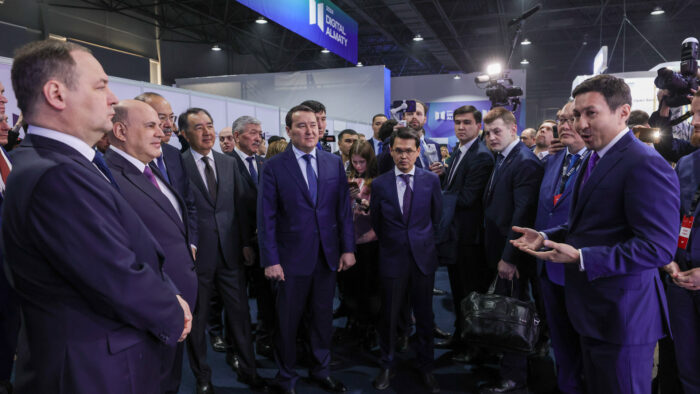ASTANA – Kazakh Prime Minister Alikhan Smailov proposed the idea to create a digital platform for the exchange of technological solutions, patents, and innovative ideas between the Eurasian countries. This was announced at a Feb. 2 plenary session of the Digital Almaty 2024 forum, reported its press service.

The plenary session of the Digital Almaty 2024 forum on Feb. 2. Photo credit: primeminister.kz.
The panel discussions gathered over 200 government officials, international experts, industry leaders, and top innovators to address the emerging prospects for digital cooperation and put forward new collaborative ideas of the Eurasian countries.
Eurasian Digital platform
In his opening remarks, Smailov called on the Eurasian states to pool efforts in developing artificial intelligence (AI) and a respective infrastructure for data processing and analysis. Kazakhstan, according to him, is ready to share its best practices and experience.

Alikhan Smailov. Photo credit: primeminister.kz.
“This will improve our interaction and provide access to the latest technologies for entrepreneurs and researchers in our region. I’m confident that joint efforts will deepen mutually beneficial partnership, contributing to technological development and the transition to the X industry,” he said.
Prior to the session, speakers of the forum, Russian Prime Minister Mikhail Mishustin, Belarusian Prime Minister Roman Golovchenko, Uzbek Prime Minister Abdulla Aripov, Deputy Chairman of the Cabinet of Ministers of the Kyrgyz Republic Adylbek Kassymaliyev, and Eurasian Economic Commission (EEC) Chairman Bakytzhan Sagintayev, attended the exhibition on Kazakhstan’s digital achievements. Over 300 Kazakh and international IT-companies, as well as government agencies presented their projects, including GovTech, AgroTech, Industry 4.0, ESG, and Smart City.
The guests were introduced to the newly developed unified platform with a one-window principle for investors and subsoil users (minerals.gov.kz). The project will facilitate and speed up the process of obtaining licenses for exploration and mining of minerals. Potential investors will be provided with a complete picture of the requested site, its infrastructure, and reports on geological study of the territory.
Digitalization of the EAEU cooperation in transport and logistics
“Today, the Eurasian Economic Union (EAEU) is a dynamically developing integration association with a population of 190 million people, a labor market of over 93 million people and a gross domestic product (GDP) of $2.7 trillion,” said Smailov at a Feb. 2 meeting of the Eurasian Intergovernmental Council.

The heads of government of Kazakhstan, Russia, Belarus, the Kyrgyz Republic, and Uzbekistan. Photo credit: Digital Almaty 2024 forum.
The EAEU trade turnover has doubled from 2015 to 2022, reaching $85 billion. The four freedoms of movement of goods, services, capital and workforce, which were agreed between the member states, remain the baseline for economic development of the EAEU nations.
Smailov underscored the growing need to develop transport infrastructure, particularly by introducing innovations. Over the past 15 years, Kazakhstan has allocated more than $35 billion in this area.
“The EAEU is located at the crossroads of East and West, North and South, and it has always been a competitive advantage of our region. Major infrastructure projects have been launched, such as the logistics center in Lianyungang, the Khorgos dry port, the Western Europe – Western China transit highway, the railway corridor from China to Iran, the modernization of the Caspian sea ports Kuryk and Aktau,” he said.
Apart from that, Smailov mentioned the launch of construction works at the Bakhty – Ayagoz, Darbaza – Maktaaral railways, the bypass line of Almaty station, and the second tracks on the Dostyk – Moynty section. In addition, he noted the ongoing development of the Kazakh terminal in the Chinese city of Xian.
“Together with the Russian, Turkmen, Indian, and Iranian sides, we also develop the eastern route of the North–South Transport Corridor. We consider it important to increase the capacity of international corridors, logistics terminals, and checkpoints of our countries. I invite all the EAEU countries to implement joint projects on the development of transit and transport infrastructure,” said Smailov.
These endeavors can be facilitated by digitalization. Digital solutions, which can be realized as part of the Digital Almaty 2024 forum, can enhance a common barrier-free market and ensure unhindered transit of goods to third countries.
“I’m convinced that the ongoing forum will contribute to solving these issues. It is important not to slow down the pace and make every effort in this direction, as the results of the work form public opinion about our integration project,” he said.
Digitized public services in Kazakhstan
Recalling the challenges of time-consuming work with documents in paper form, Smailov noted that “today’s digitalization has optimized all these processes and more than 90% of public services are now digitized in Kazakhstan.”
For example, Digital Family Map has integrated data of 6.3 million Kazakh families. The automated system identifies and helps families in difficult life situations. It allows timely social assistance without the need for citizens to appeal directly to the government.
“We are also implementing the Invisible Government concept, which provides 40 types of public services in a proactive format. Public services in the applications of our commercial banks serve as another successful example of cooperation between the state and business. These include online mortgages, purchase and sale of cars, paying taxes, and receiving benefits,” he said.
The regulatory principles between the government and business representatives were introduced from scratch and are based on automated risk management systems.
“This makes it possible to increase the effectiveness of control and significantly reduce the number of inspections. The strategic objective is to integrate AI into public services to speed up the processing of requests and improve the quality of service,” he said.
Smailov also brought an example of the CEREBRA project aimed to quickly diagnose a stroke through digital technology. Last year, following the launch of the initiative in Kazakhstan, domestic developers entered the Uzbek market. Now, they are ready to share expertise globally.
On the first day of the forum, Kazakh Minister of Digital Development, Innovation and Aerospace Industry Bagdat Mussin presented Kazakhstan’s new initiatives in the development of information and communication technologies (ICT) and shared best cases of the country’s digital projects.

